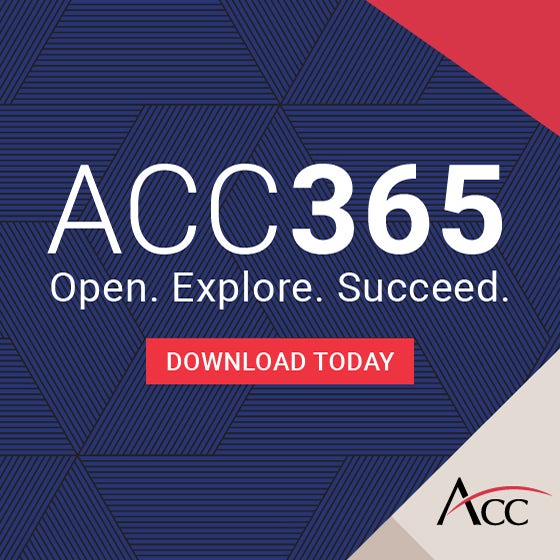With businesses under heightened regulatory pressure, cyber attacks on the increase, and high profile wage theft cases making the news, it is no surprise that workload pressures on in-house counsel continue to mount.
While helping businesses manage regulatory risk has always been a key responsibility of in-house legal teams, respondents to the Association of Corporate Counsel’s 2019 In-House Counsel General Trends Report believe their roles are expanding; they are being expected to provide more support across the business - without the benefit of additional resources. As a result, they are seeking to make their teams more operationally efficient, and are turning to outsourcing (outside of the traditional law firm paradigm) as a solution.
All of this takes time. As their work hours increase, many in-house counsel are keen to leverage their company’s work-life balance policies, but hesitate to do so for fear of it adversely affecting their careers.
Increased Challenges for In-House Legal Teams
The Trends Report noted that increased regulation and compliance requirements are adding significantly to the workload of in-house teams, with privacy, data security, and the Modern Slavery Act being common themes.
- Cyber breaches: 34% of the respondent’s organisations experienced cyber-attacks over the past 12 months. This ongoing threat has added pressure to in-house counsel to stay abreast of data protection and privacy laws, to ensure their organisations can quickly and efficiently handle a breach.
- Financial regulation: The Royal Commission into the banking and finance industry continues to have a flow-on effect to other industries, with financial processes and contracts becoming more complicated and coming under greater scrutiny. This, in turn, has increased the risk management workload for legal teams. One-third of respondents lacked confidence in their ability to identify risks such as wage theft.
Regardless, in-house counsel are progressively being relied on to advise the broader business on compliance matters. In some companies, in-house counsel has the broadest organisational reach in terms of relationships and influence, making them a valuable contact point and resource. In-house teams are heavily focused on ensuring that their legal priorities are aligned with broader organisational priorities, with over 60% of respondents confirming this to be the case.
Outsourcing Increasingly Becoming Essential
Unsurprisingly, the Trends Report found that outsourcing has become essential to helping in-house legal teams meet deadlines, manage costs and respond to ever-increasing demands on their time.
The Report contains some revealing insights into the outsourcing process:
1. Service Provider Selection
Service providers are usually chosen by in-house counsel based on their understanding of the organisation’s requirements and their specialist expertise. Those who provide added value in terms of knowledge sharing, professional development and shared newsletters are more highly regarded.
Legal teams continue to use panel arrangements for outsourcing, but an increasing number are reviewing their make-up, especially if their business is moving into new jurisdictions.
2. Leveraging NewLaw Firms
NewLaw firms are predominantly being selected based on their ability to be responsive to changing needs. They are also being selected based on providing increased flexibility, a lower cost base, and improved value.
Among respondents, the most popular NewLaw business models are:
- Lawyer placement agencies;
- Fixed fee firms; and
- Legal process outsourcing providers.
3. Legal Process Outsourcing Growing Slowly
Legal Process Outsourcing (LPO) represents an opportunity for in-house counsel, who are still not broadly leveraging this resource. When LPOs are engaged it is due to:
- perceived cost and time savings; and
- the increased efficiencies they offer to counteract a lack of internal resources.
In-house counsel are also increasingly aware of the benefits that come with streamlining their legal operations. One in five respondents said they have a team member dedicated to improving efficiencies, with another 8% expecting to introduce such a role in the next 12 months.
4. Integrating Legal Technology
In-house counsel are using technology to empower their teams, allowing them to spend more time on high-value tasks while ensuring routine work is still completed. The most common technology used is:
- Legal libraries (28%);
- Document management software (21%);
- Virtual data rooms (18%);
- Contract management software (13%); and
- Matter/case management software (12%).
Work-life Balance a Perceived Career Barrier
With workload being a growing issue for in-house counsel, the Trends Report turned its attention to work-life balance. Unsurprisingly, longer working hours are becoming increasingly prevalent, with nearly 40% of in-house legal teams working between 40 and 50 hours a week, and over 20% working up to 60 hours a week.
Unfortunately, most in-house lawyers are reluctant to use their company’s work-life balance policies out of a perceived concern that it will adversely impact their career. At best, they take advantage of work-from-home policies.
Key Takeaways
With increased regulatory complexity and cybersecurity breaches, in-house legal teams are struggling to stay on top of their workloads. Burn out is a real risk, with most lawyers working up to 50 hours a week, with no relief in sight.
The in-house counsel who are successful in reducing their risk and increasing their time availability are those who outsource part of their workload. The real opportunity lies within outsourcing to NewLaw firms, which represent increased flexibility and value.
To download the full report click here*
Laini Bennett is Head of Content at LegalVision. She is responsible for LegalVision’s freely available database of articles and publications. LegalVision is a market disruptor in the commercial legal services industry and provides a range of legal solutions specifically directed at large corporates, fast-growing businesses and enterprise clients that have a higher volume of legal needs. The firm was recently named the 'Fastest Growing Law Firm in the Asia-Pacific' by the Financial Times.
*report available to members only

